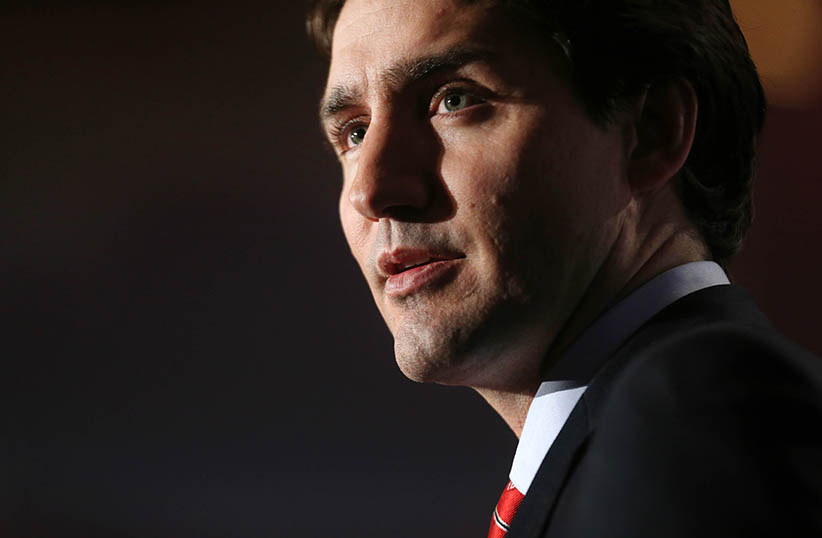Justin Trudeau and a Liberal take on liberty
Paul Wells on Trudeau’s speech, Bill C-51 and a nation’s capital, gripped with fear
Steve Russell/Toronto Star/Getty Images
Share

Listen to Paul Wells read his column, or subscribe to Maclean’s Voices on iTunes or Stitcher for on-the-go listening:
Here in the nation’s capital, the Rideau Canal has finally thawed and everybody’s odious.
“Where is the fear?” Steven Blaney, the generally amiable minister of public safety, said to a committee studying the government’s proposed anti-terrorism law, Bill C-51. “The fear is on the side of those who are attacking this bill.” And then he said that C-51 seeks to criminalize pro-terrorist speech because “the Holocaust did not begin in the gas chambers, it began with words.”
So. The government’s opponents are fear-mongering, to hear the minister tell it, and they’re also increasing the likelihood of some new Holocaust. As long as you don’t see any connection between the Holocaust and fear, the minister was being perfectly consistent.
Blaney spoke a day after Justin Trudeau delivered a humdinger of a speech in Toronto. It was certainly Trudeau’s most important speech since he became Liberal leader, and probably the first time he has substantially helped his cause since last summer. Not that his arguments will be universally popular. Certainly, members of the Harper government didn’t like what he said one bit.
The Liberal’s general theme was personal liberty. To him, this includes the right to wear what one wishes in public, including a niqab—a veil some Muslim women use to cover their faces—and during a citizenship ceremony, at that. In February, Stephen Harper told a Quebec City radio host that his government will appeal an “offensive” Federal Court decision permitting Zunera Ishaq, a Toronto woman, to wear a niqab at her citizenship ceremony. Covering one’s face is “not how we do things here,” the PM said then.
Trudeau’s reply, in his Toronto speech: “We should all shudder to hear the same rhetoric that led to a ‘none is too many’ immigration policy toward Jews in the ’30s and ’40s, being used to raise fears against Muslims today.”
That led Jason Kenney, the author of the niqab ban when he was immigration minister, to spend the next day on Twitter hurling opprobrium in Trudeau’s direction. “It is obscene to conflate the essentially public nature of the citizenship oath with an anti-Semitic bar on refugees fleeing the Holocaust,” Kenney wrote.
Related:
Interview: Jason Kenney responds to Justin Trudeau’s speech
Aaron Wherry: Justin Trudeau and the niqab
He has a point; several, as always. Mackenzie King’s Liberal government was way better at keeping Jews out of Canada (5,000 for the entire duration of the Second World War, when it was really important to accept Jews) than the Conservatives have been at keeping Muslims out (Canada’s had 300,000 Muslim immigrants since 2006). There are Muslims in the Conservative caucus, whose legislative record is not inferior to the Liberals’ on issues of respect for ethnic diversity.
It was not a great week to make the point. Kenney’s colleague John Williamson had just finished apologizing for calling temporary foreign workers “brown people” who work while “whities” are paid to stay home.
Trudeau hadn’t the faintest interest in carefully assaying the merits of various parties on inclusiveness. He was engaging cheerfully in polemic, a taste in which Harper Conservatives have been known to indulge themselves from time to time. “It’s time Liberals took back liberty,” he said. “These Conservatives pretend to talk a good game about freedom, but look at what they’ve done with it.”
In seven years in Parliament, Trudeau said, he has “heard the Conservative Prime Minister accuse two leaders of the NDP of sympathizing with terrorists” and heard Vic Toews, Blaney’s predecessor at Public Safety, tell opponents they were either “with us, or you’re with the child pornographers.”
Trudeau defined liberty broadly enough to include women’s right to access abortions, which he rated “more important than the right of a legislator to restrict her freedom with [his or her] vote. MPs who disagree with that have other choices. They can sit as Independents, or as Conservatives.”
But he kept circling back to the niqab at a citizenship ceremony: “For me, it is basic truth that prime ministers of liberal democracies ought not to be in the business of telling women what they can and cannot wear on their head during public ceremonies.”
Trudeau was threading a slender needle here. Before linking Harper to King’s wartime anti-Semitism, he talked at length about Rania El-Alloul, who was kicked out of a Quebec court for wearing a hijab, a headscarf that didn’t cover her face. But as Trudeau certainly knows, Harper’s office has defended Alloul’s right to wear a hijab. So to call her story “part of a troubling trend that Mr. Harper seems keen to . . . exploit” isn’t really cricket.
Trudeau was in Toronto to pick a fight. By siding with a court, and the Charter, over what Harper and many Conservative voters prefer in the niqab case, he was reminding traditional Liberal voters what the Liberal side of an argument sounds like. It had been a while. The last three Liberal leaders kept forgetting to do that. Harper gave a speech in 2003 to a conservative social club, Civitas, that reads a decade later as a manifesto for everything he does. This was Trudeau’s rebuttal. Neither man’s vision is acceptable to every Canadian. Each man’s first goal is to reassure and motivate his own base. One condition of success in politics is the ability to wave a serene goodbye to everybody who will never vote for you.